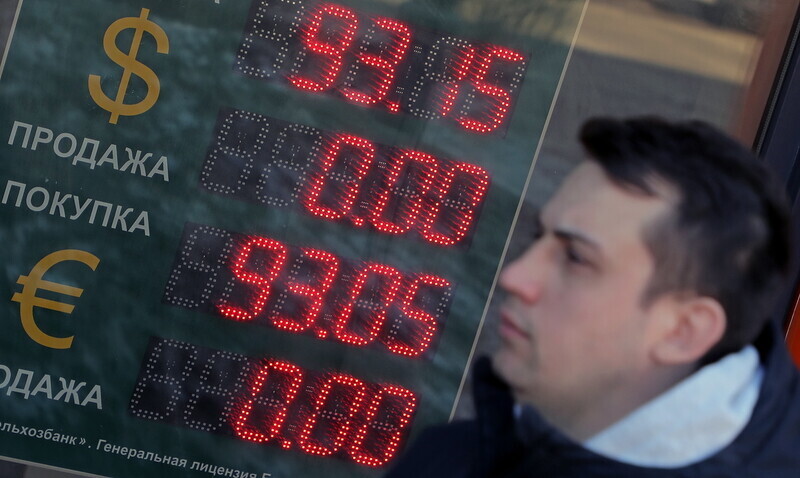
A person walks past a sign showing exchange rates in Podolsk, Russia, on March 24. (EPA/Yonhap News)

Lee Kang-kook
By Lee Kang-kook, economics professor at Ritsumeikan University
“I woke up early in the morning to the sounds of shelling, and I still haven’t taken refuge.”
A student of mine on a leave of absence in Kyiv sent me this email shortly after Russia invaded Ukraine.
It’s been over a month now since Russian President Vladimir Putin invaded Ukraine. Contrary to the initial predictions, the capital has not fallen, and the Russian troops seem to be struggling. The US and Europe have responded swiftly with financial and trade-related sanctions against Russia, while global businesses have pulled out of the country.
The effects of the war on the global economy, which is still recovering from COVID-19, include stagflation pressures as prices rise and business conditions are set back. According to the International Monetary Fund, the war is poised to deal a blow to the global economy in the form of sharply rising grain and energy prices, international trade interruptions, and supply chain paralysis. The growing uncertainties also stand to put a damper on investment and cause financial conditions to worsen.
Given the important place that Russia holds in the global energy market — and in European energy imports in particular — the effects have included a steep rise in oil and natural gas prices. Russia also accounts for major production of the metals needed to manufacture batteries and semiconductors, including nickel, cobalt and palladium. Prices of these metals have also been soaring, with predictions of a supply crunch on the horizon.
Additionally, Ukraine and Russia account for around 30% of global wheat exports. Wheat prices have skyrocketed, causing particular difficulties for poorer countries. According to the Organisation for Economic Co-operation and Development, the global economic growth rate is expected to decline by roughly a percentage point this year, with inflation rising by another 2.5 percentage points or so.
Some are even predicting that the war in Ukraine could usher in the end of the era of globalization.
Globalization originally took off amid increased international trade and investment after the Cold War came to a close. It sparked growth in emerging economies, substantially reducing the population living in poverty while allowing consumers in the advanced economies to access cheap imported products.
Obviously, the rapid globalization of finance also resulted in financial instability and crisis. Manufacturing jobs were lost, and inequality worsened in the US and other advanced economies, leading to popular discontent and the emergence of populist politics.
The trend toward globalization entered a period of stagnation in the wake of the global financial crisis of 2007–2008. Its slump deepened amid the protectionist trade measures and US-China conflicts that arose after Donald Trump was elected US president in 2016.
Faced with the paralysis of the global supply chains amid the COVID-19 pandemic that erupted in 2020, countries around the world have been speeding up their “de-globalization” process, seeking stable supply chains at home instead of cost-cutting.
Breaking out in the pandemic’s wake, the war in Ukraine has been dealing another blow to globalization’s march. Now an international political conflict over dominance is destabilizing the global economy and reversing the progress of globalization.
The front in this conflict is a confrontation between the world’s liberal democracies, as represented by the US and the countries of Europe, and its authoritarian powers, as represented by China and Russia.
In retrospect, both countries have been key pillars of globalization since the 1990s: China with its manufacturing industry production and exports, Russia with its energy and raw material exports. The two of them became closely integrated with the global economy in the process. The West had hoped that the growing economic interdependence associated with globalization would establish a liberal global economic order, expanding political freedoms around the world and ushering in change in China and Russia.
The reality has turned out differently. The number of authoritarian countries has only been increasing lately around the world; economically, there has been an accelerating trend of regional integration rather than globalization.
The US and China have been at odds, promoting domestic production in strategic industries. China and Russia have been moving to conduct crude oil transitions in their own currencies.
The hopes that globalization would bring about peace are now coming crashing down. Around the world, countries now worry that economic interdependence could end up being a bigger risk than its worth.
The fear now is that these deepening rifts in the global economy and conflicts in global politics could incur enormous costs for the world. In the long term, this will get in the way of prosperity for the global economy — and in a worst-case scenario, it could lead to military conflicts.
Writing in the Financial Times, Martin Wolf said the new world that is currently emerging looks like a “catastrophe.”
What the war in Ukraine ultimately shows us is that the frictions of international politics are putting the age of free trade and globalization in dire jeopardy.
But what we need now for the sake of global economic prosperity is not a move away from globalization, but efforts to achieve a new kind of globalization that acknowledges the diversity of systems, seeks peace, and manages openness and security in a harmonious way.
Not long ago, I heard from my student in Ukraine that they had taken refuge in their hometown. I hope that I can see them back in my classroom soon.
Please direct questions or comments to [
english@hani.co.kr]





